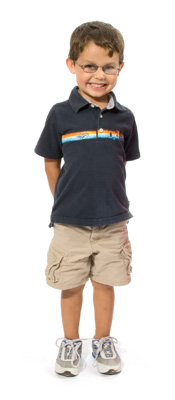What to Expect as Your Child Grows:
Well Child Care at 5 Years
Behavior Control
You need to punish your child for dangerous or hurtful behaviors. Also teach your child to apologize. Sending a child to a quiet boring area without anything to do for five minutes should follow.
Dental Care
- Brushing and flossing teeth regularly after meals and before bedtime is important. Think up a game and make brushing fun.
- Make an appointment for your child to visit the dentist if you have not already done so.
Safety Tips
- Accidents are the number one cause of serious injury and death in children. Keep your child away from knives, power tools, and mowers. All firearms should have trigger locks set to safety.
- Fires and Burns
- Practice a fire escape plan.
- Check smoke detectors and replace the batteries as needed.
- Keep a fire extinguisher in or near the kitchen.
- Teach your child never to play with matches or lighters.
- Teach your child the emergency phone numbers and to leave the house if fire breaks out.
- Turn your water heater down to 120° Fahrenheit. - Falls
- Never allow your child to climb on chairs, ladders, or cabinets.
- Do not allow your child to play on stairways.
- Make sure windows are closed or have screens that cannot be pushed out. - Car Safety
- Everyone in a car should always wear seat belts or be in an appropriate booster seat or car seat.
- Don't buy motorized vehicles for your child. - Pedestrian and Bicycle Safety
- Always supervise street crossing. Your child may start to look in both directions, but do not depend on his ability to cross a street alone.
- All family members should use a bicycle helmet when riding, even when riding a tricycle.
- Do not allow your child to ride a bicycle (or tricycle) near traffic.
- Do not buy a bicycle that is too big for your child. - Water Safety
- Always watch your child around swimming pools.
- Consider enrolling your child in swimming lessons.
- If you own a swimming pool, you should install a pool-fence around it. You should also consider taking a CPR class. - Poisoning
- Teach your child to take medicines only with supervision.
- Teach your child never to eat unknown pills or substances.
- Put the poison center number on all phones. - Strangers
- Discuss safety outside the home with your child.
- Teach your child his address and phone number and how to contact you at work.
- Teach your child never to go anywhere with a stranger.
Smoking
- Children who live in a house where someone smokes have more respiratory infections. Their symptoms are also more severe and last longer than those of children who live in a smoke-free home.
- If you smoke, set a quit date and stop. Set a good example for your child.
What to Expect at This Visit
- If your child has not already received the immunizations required for kindergarten, he may on this visit.
- We will check your child's hearing and vision.
- Children over six months of age should receive an annual flu shot.
- After a shot your child may run a fever and become irritable for about one day. Your child may also have some soreness, redness, and swelling in the area where a shot was given.
- For fever, give your child an appropriate dose of acetaminophen. For swelling or soreness put a wet, warm washcloth on the area of the shot as often and as long as needed for comfort.
- Call your child's healthcare provider immediately if:
- Your child has a fever of over 105° Fahrenheit.
- Your child has a severe allergic reaction beginning within two hours of the shot (for example, hives, wheezing, or noisy breathing, or swelling of the mouth or throat).
- Your child has any other unusual reaction.
Next Visit
A check-up is recommended when your child is six years old.



